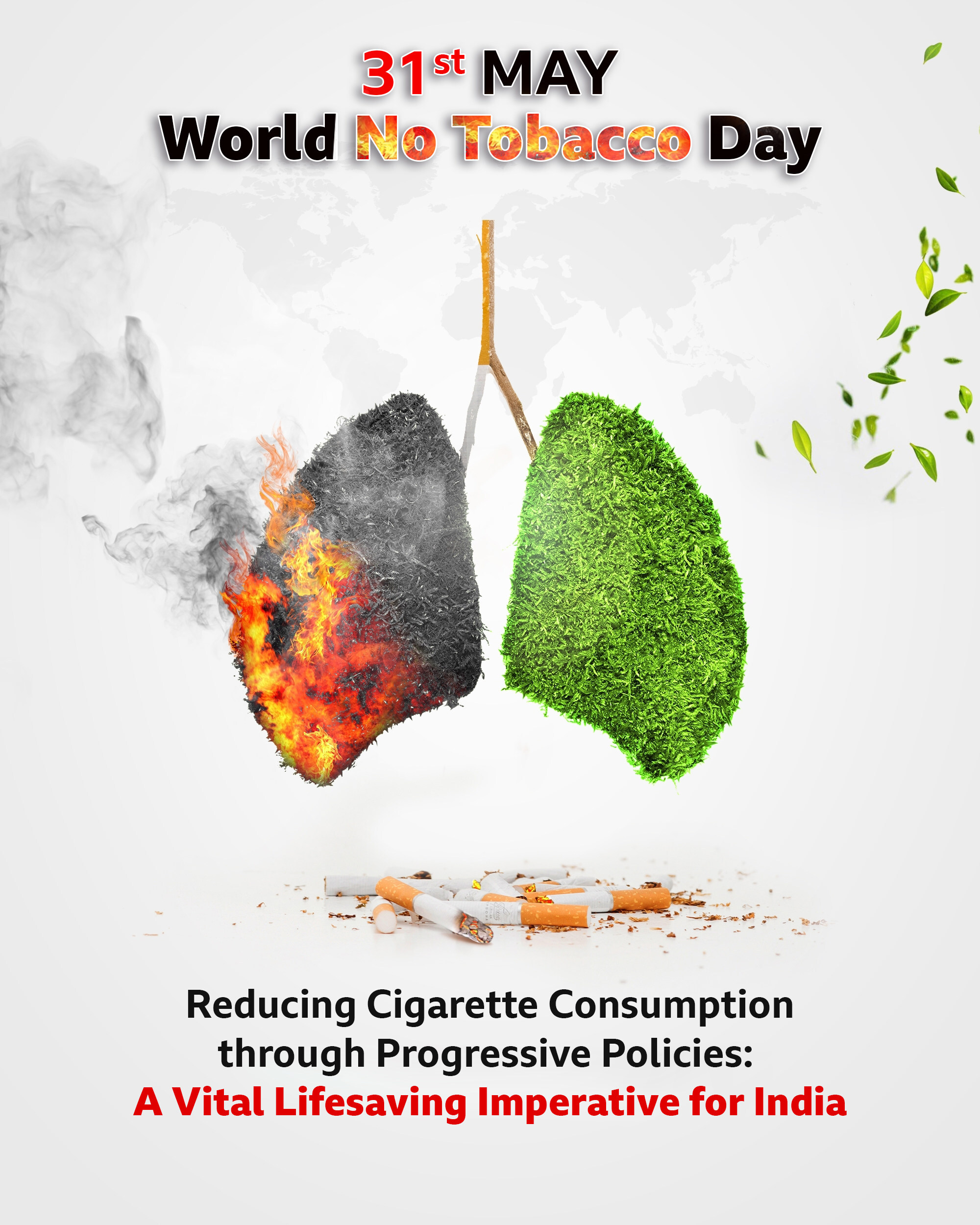Reducing Cigarette Consumption through Progressive Policies: A Vital Lifesaving Imperative for India
NEW DELHI, May 31, 2024 -- As India rises to prominence in an unpredictable and rapidly changing world, the persistent tobacco epidemic continues to remain one of the gravest public health threats in the country. India grapples with a staggering challenge in tobacco consumption, recording one of the highest usage rates globally. In 2020, 27% of the population aged 15 and above were tobacco users, while more than 120 million were adult smokers. Both smoking and oral forms of tobacco are alarmingly prevalent. Therefore, it is crucial to implement progressive policies that align with the user's psychometric journey, to minimize the impact on them effectively. On this World No Tobacco Day, subject matter experts and members of the Global Sustainability Alliance's (GSA)' Leadership Council for Good Health and Well-being, a coalition uniting stakeholders committed to achieving equitable and sustainable goals, passionately highlighted the urgent need for adopting progressive harm reduction strategies that could potentially save 1.35 million lives annually.
Tobacco-induced diseases currently impact almost 267 million lives in the country alone, with countless more at risk of this epidemic. In 2019, the World Health Organization (WHO) reported that tobacco use cost India almost 1% of its GDP due to disease and premature deaths. Treating tobacco-related illnesses consumes almost 5.3% of the nation's health expenditure, amounting to Rs. 13,500 crores, annually, in medical expenses and productivity losses.
Implementing effective tobacco control policies could significantly reduce these losses, freeing up crucial economic resources for other social policies. This is especially important for a country like India, where reducing non-communicable diseases, such as cancer and chronic obstructive pulmonary disease (COPD), is vital for accelerating sustainable development within the country.
Sharing the dire state of India's tobacco epidemic, Dr. Bharat Gopal, Director & Head, Dept. of Pulmonology, Critical Care & Sleep Medicine, Delhi Heart and Lung Institute (DHLI), said, "Tobacco use, specifically cigarettes and oral tobacco, have a devastating impact on the Indian population. Numerous lives are lost daily due to consumption of tobacco. According to the report titled 'Human Centric Approach to Tobacco Control', 27% of Indians use tobacco in some form, eventually resulting in a heavy disease burden, which is heart-wrenching to witness, the daily impact it has on families nationwide. It is a known fact by now that tobacco smoke contains over 70 known carcinogens. Smoking damages nearly every organ in the body, leading to numerous diseases and overall diminished health. Many countries like the UK, Sweden & Japan have successfully reduced tobacco consumption, owing to evidence-based policies that their respective governments have adopted."
In 2018, there were 250 million tobacco users aged between 16 to 64 in India. While smoking rates are lower than the global average, they remain substantial. The prevalence of smoking among young adults aged 20–44 is particularly alarming, as this group actively contributes to the workforce. Smoking cigarettes and bidis alone account for a drastic 54.2 percent of the tobacco-using population.
Prof. Dr. R Zimlichman, Director of the Brunner Institute for Cardiovascular Research at Tel Aviv University's Sackler Faculty of Medicine, commented on the global success of progressive tobacco policies, saying, "Global policies aiming to reduce harm have seen success in multiple countries. We know stopping smoking is ideal, but the reality is that millions struggle to quit. Sweden is a great case study for policymakers, to see how harm reduction, a scientifically proven strategic policy approach, offers a pragmatic and potentially life-saving alternative. Embracing these strategies has led to a remarkable decline in mortality rates in Sweden, with almost a 41% lower incidence of cancer in the country, as compared with the EU. The world needs standardized alternatives, promoted by governments, for their safety and efficacy. Delay in implementing these measures costs millions of lives worldwide."
Further emphasizing the importance of scientific strategies for India, Dr. Karan Thakur, Vice President, Apollo Hospitals, New Delhi, stated, "India is the second-largest tobacco consumer in the world, despite growing awareness about its adverse health effects. We critically need harm reduction strategies to lower tobacco-induced diseases, like cancer. Medical practitioners should advise patients to quit tobacco through approved nicotine replacement therapies and provide less harmful alternatives under strict regulation, for those who cannot quit entirely. Given the current scenario, it is extremely important for public health strategies to emulate the success of progressive policies, relying on innovation and scientific evidence."
As India stands on the brink of becoming a global economic leader, it is vital that the country and its policy leaders adopt successful strategies to support tobacco users and enhance public health. Tobacco, as a grassroots issue, necessitates increased awareness of the associated health risks. A healthy population is essential for India to fully realize its competitive advantage on the world stage — its citizens. Implementing progressive policies is essential not only for achieving a tobacco-free nation but also for mitigating the substantial health and economic burdens imposed by tobacco use. Adopting harm reduction and innovative strategies can save lives and pave the way for a healthier and more prosperous future for India.
About Global Sustainability Alliance's Leadership Council for Good Health and Well-being
The Global Sustainability Alliance's Leadership Council for Good Health and Well-being is an initiative of The Times Group's Global Sustainability Alliance (GSA) and ET Edge. The Council is a think-and-do tank that works towards driving meaningful change through the study and evaluation of real-world issues. The Council's main purpose is to facilitate the exchange of cutting-edge ideas and foster discussions on practical and innovative approaches to accelerate the achievement of the Sustainable Development Goals (SDGs) at both national and global levels. As a unique cross-disciplinary network of decision-makers, we propose actionable strategies and policies to expedite the realization of the UN SDGs. We collaborate with government bodies, the public and private sectors, including diverse stakeholders, to share groundbreaking concepts in our pursuit to advance the agenda for Sustainable Development.
This News is brought to you by Qube Mark, your trusted source for the latest updates and insights in marketing technology. Stay tuned for more groundbreaking innovations in the world of technology.








